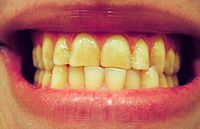
Photo from wikipedia
Purpose The impact of onabotulinum toxin type A (BoNT-A) on bladder afferent nerve pathways and chemosensory functions is an active area of investigation. There may be a role for BoNT-A… Click to show full abstract
Purpose The impact of onabotulinum toxin type A (BoNT-A) on bladder afferent nerve pathways and chemosensory functions is an active area of investigation. There may be a role for BoNT-A in disorders of the ureter; however, no histologic studies have assessed the effects of BoNT-A on ureteral tissue. Our objective was to develop an animal model of ureteral inflammation and determine the impact of ureteral BoNT-A instillation on known mechanisms of inflammation. Methods The safety and feasibility of a novel animal model of ureteral inflammation was assessed. Through open cystotomy, the effect of ureteral BoNT-A instillation on inflammation was determined through H&E, masson’s trichrome, Ki-67 stain, and prostaglandin E (PGE) synthase expression, a known marker of pain and inflammation in ureteral tissue. Urothelial microstructure was assessed using electron microscopy and standard histologic techniques. Results All experiments were carried to completion, and no systemic signs of botulinum toxicity were seen. BoNT-A exposure was associated with a decrease in PGE synthase expression in a dose-dependent fashion. BoNT-A exposure was not found to impact collagen deposition or cell proliferation. Disruption of tight junctions between urothelial cells was observed under conditions of inflammation. Conclusion We describe the feasibility of a novel in vivo model of ureteral inflammation and report the first histologic study of the effects of BoNT-A on the ureter. Preliminary findings show that BoNT-A attenuates ureteral PGE synthase expression under conditions of inflammation. The application of BoNT-A may provide anti-inflammatory and analgesic effects in the context of ureteral disorders.
Journal Title: World Journal of Urology
Year Published: 2020
Link to full text (if available)
Share on Social Media: Sign Up to like & get
recommendations!